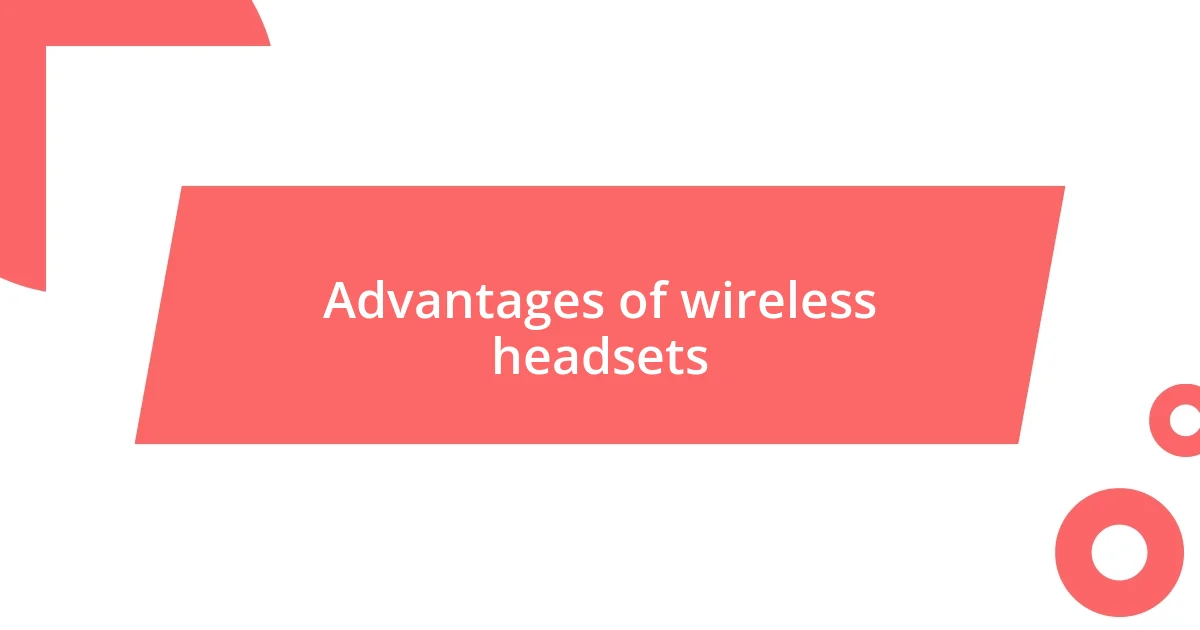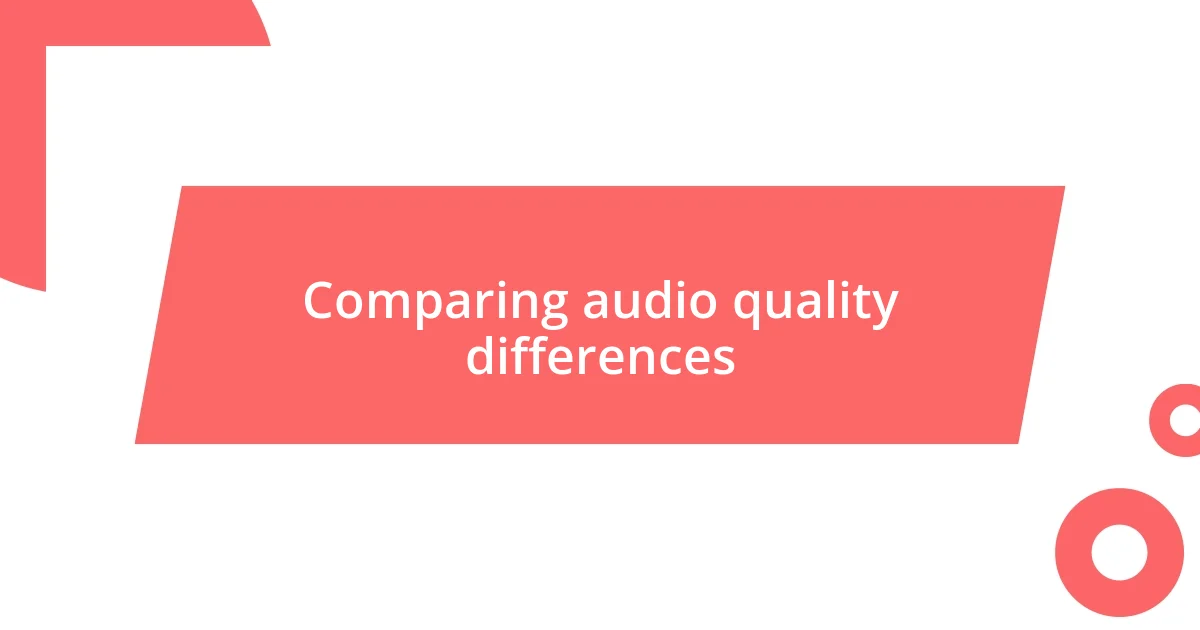Key takeaways:
- Wireless headsets offer mobility and convenience, but may have issues with battery life and audio latency, which can impact gaming performance.
- Wired headsets provide consistent audio quality, reliability, and durability, making them preferable for competitive gaming without the worry of interruptions.
- Choosing the right connection type depends on gaming style and priorities, with wired options being superior for fast-paced games that require precise audio cues.

Understanding gaming headset options
When exploring gaming headset options, one of the first things I consider is connectivity. Do I want the freedom of wireless, or do I prefer the reliability of a wired connection? I remember the thrill of moving freely around my room during a gaming session with a wireless headset, only to later experience the annoyance of battery life running out in the heat of battle. That said, a wired headset often provides a more consistent audio quality—something that can make a huge difference during competitive play.
There’s also the matter of compatibility. It’s crucial to ensure that your headset works seamlessly with your gaming console or PC. I learned this the hard way when I bought a flashy wireless headset, only to find it didn’t support my older console. I think about how frustrating that was as I tried to troubleshoot, only to realize I had wasted time and money. So, my advice? Always check compatibility before making a decision to save yourself from a similar fate.
Finally, let’s talk about features like surround sound and microphone quality. These aspects can elevate your gaming experience significantly, allowing you to hear every footstep or dialogue with crystal clarity. I’ve had headsets that promised surround sound only to find it lacking, which was disappointing. It’s worth investing time in trying different models and seeking out reviews to find the best fit for your needs and make sure your cash isn’t just buying marketing buzz.

Exploring wired headset benefits
Exploring the benefits of wired headsets has been quite an eye-opener for me. I still vividly recall the first time I plugged in a wired headset—there was this immediate sense of assurance that the sound would be crystal clear without any interruptions. The audio quality was night and day compared to some wireless models I’d tried, especially when I was in the middle of an intense gaming session. Poor sound quality can actually derail your focus, so having that reliability is invaluable during crucial moments.
Here are some benefits I’ve experienced with wired headsets:
- Consistent Audio Quality: No static or dropouts, just pure sound.
- No Battery Concerns: I never have to worry about my headset dying mid-game.
- Superior Lag-Free Experience: With a direct connection, the latency is practically nonexistent.
- Wider Compatibility: Most wired headsets can easily connect to multiple devices without additional adapters.
- Durability: I find that wired headsets often have a more robust build, which stands up to the wear and tear of daily use.

Advantages of wireless headsets
When it comes to wireless headsets, one significant advantage is the freedom of movement they provide. I can’t tell you how liberating it feels to leap off the couch out of excitement during a gaming session while still being completely connected. Imagine you’re in the heat of battle, and you spot your snacks across the room—you can grab them without missing a beat in your game! This level of mobility is something I genuinely cherish and can’t overlook.
Another benefit I’ve experienced is the convenience of not having to deal with tangled cords. I remember my early gaming days, constantly fighting with wires that seemed to have a mind of their own. Wireless headsets today almost eliminate this hassle, allowing me to enjoy my gaming without those pesky cables getting in the way. It’s such a relief—my gaming space feels far more organized, and I can focus entirely on the gameplay instead of untangling cords.
Lastly, wireless headsets often come with advanced features like Bluetooth connectivity, allowing me to switch between devices effortlessly. I once found myself switching from gaming on my console to chatting on my phone without swapping headsets. The versatility is a game-changer! It’s like having one device that caters to multiple needs, making it a worthwhile investment for anyone serious about their gaming experience.
| Advantages | Wireless Headsets |
|---|---|
| Freedom of Movement | Enjoy gaming without being tethered to the console |
| Convenience | No tangled wires to deal with |
| Versatility | Connect to multiple devices seamlessly |

Comparing audio quality differences
I’ve noticed some stark differences in audio quality between wired and wireless headsets during gameplay, and it’s a topic worth diving into. For instance, while testing a high-end wireless model, I was caught off guard by a subtle audio lag, especially in high-stakes multiplayer scenarios. That tiny delay, known as latency, can mean the difference between victory and defeat; it definitely had me second-guessing my every move.
On the flip side, with my trusty wired headset, I found the audio to be incredibly immersive. I vividly recall the first time I heard the rustling of leaves and distant explosions as a result of the superior sound clarity. There’s something about that instantaneous feedback that makes me feel connected to the game world. Ever miss out on an audio cue because your headset was struggling? It makes you appreciate the depth and richness that wired audio can provide.
Ultimately, the distinction in audio quality also ties back to comfort during long gaming sessions. I remember opting for a wireless headset during a marathon gaming night, only to find that at a critical moment, the sound dropped out during a tense scene! That panic of wondering whether it was a device glitch or an incoming enemy was enough to send my heart racing. In contrast, my wired headset offered peace of mind, letting me fully indulge in the gaming experience without the worry of losing audio when it mattered most. Wouldn’t you agree that being fully immersed definitely enhances the thrill?

Assessing latency and reliability
When I think about assessing latency, I can’t help but recall that nail-biting moment during an intense gaming session. I remember using a wireless headset when I heard my opponent approaching. That slight delay in audio—a mere fraction of a second—felt like an eternity as I fumbled to react. It’s incredible how latency can impact your performance, turning a split-second decision into a missed opportunity. Have you ever experienced that agonizing feeling of knowing you should’ve acted faster? It’s frustrating, right?
Reliability also plays a crucial role, especially when you’re in the zone. I once faced a potentially game-winning moment when my wireless headset suddenly lost connection. The silence interrupted my focus, and my adrenaline spiked as I scrambled to reconnect. It was a harsh reminder of how unreliable a wireless connection can sometimes be. Now, whenever I gear up for crucial matches, I always gravitate back to my wired headset. It’s just reassuring to know that whether I’m on a winning streak or fighting my way back, I’m connected without any interruptions.
To put it simply, audio performance is about more than just sound—it’s about ensuring that you can fully engage in the experience. There’s nothing quite like the satisfaction of hearing an enemy’s footsteps directly behind you without hesitation. I cherish those moments where everything flows seamlessly, and I can focus on strategy without worrying about lag or dropouts. Sometimes, I find myself asking, is being in the moment worth the risk of a wireless setup? For me, that answer is clear.

Importance of battery life
Battery life is a game-changer when it comes to selecting a gaming headset. I recall an evening spent gaming with friends online, fully immersed in the thrill of competition. Just as the tension peaked and the final round approached, my wireless headset’s battery indicator flashed red, sending my heart into my throat. What’s more stressful than knowing you’re on the brink of victory but instead staring down the clock, praying you can finish before the sound cuts out?
Long-lasting battery life not only enhances gameplay but also alleviates the nagging anxiety of interruptions. There was a time when I was deep into an adventure game, and the gripping storyline had me on the edge of my seat. Suddenly, the audio cut out because my headset’s battery dwindled. I experienced that sinking feeling—missing critical dialogues and ambient sounds was like watching my favorite movie with half the scenes missing. It really makes you think: how great can a gaming experience be if you’re constantly worried your headset will die?
On the other hand, I find immense comfort in headsets with long battery life. I once invested in a model that offered over 20 hours of playtime. Those marathon sessions became significantly less stressful. I could dive into a fantasy world without glancing at my battery level every few minutes. Wouldn’t it be nice to focus solely on the game rather than scrambling for a charger? I truly believe that battery life is an often-overlooked aspect that directly influences our enjoyment and immersion during gaming.

Choosing the right connection type
Choosing the right connection type for your gaming headset is a crucial decision that can greatly affect your experience. I remember the excitement of trying out my first Bluetooth headset, only to realize that while it felt freeing, the occasional audio drop made me feel like I was gambling with my game. Have you ever been halfway through a raid, and then suddenly, poof—silence? It’s a gut-wrenching feeling, isn’t it? I learned quickly that while wireless is convenient, for competitive gaming, wired connections often win out for that seamless experience.
Another aspect to consider is the type of games you play. If you’re deep into fast-paced shooters, every millisecond counts. I once dove into a battle royale match with friends using a USB-C wired headset. The clarity and timing were immaculate—the way I could pinpoint every enemy footstep made me feel like a true sharpshooter. On the other hand, when I switched to a casual title, the flexibility of a wireless connection felt liberating. It’s all about balance, and knowing what your priorities are when gaming helps in making that choice.
Ultimately, the connection type dictates not just how you hear the game but how you communicate with teammates. I remember strategizing with my squad during a tense dungeon raid, every line of command crucial. Using a wired connection here, I reveled in the reliability. I often ask myself: how much does my connection type enhance or hinder my gameplay? In moments of pressure, I find that each choice reflects my gaming style and the intensity of my battles. Choosing the right connection isn’t just a technical decision; it’s about creating an experience that enhances every thrilling moment.















